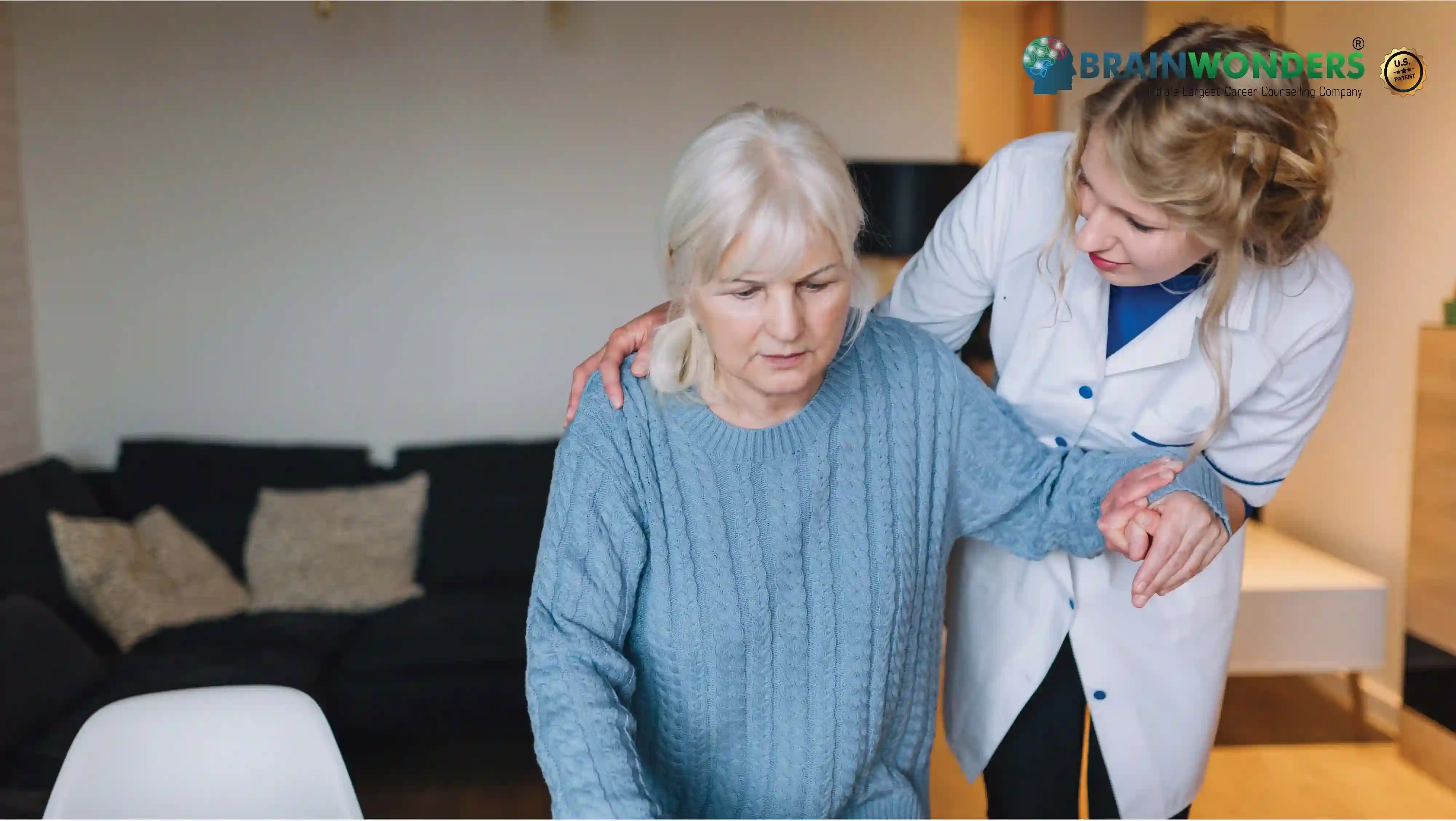How to become a Community Health Worker
Overview, Courses, Exam, Colleges, Pathways, Salary

Overview
Who is Community Health Worker ?
A Community Health Worker (CHW) is a frontline public health worker who bridges communities and healthcare services. They are typically members of the community they serve and have a deep understanding of the local culture, language, and social dynamics. CHWs promote health and well-being by providing education, outreach, and support to individuals and communities.
The responsibilities of a CHW can vary but often include:
- Conducting health assessments.
- Facilitating access to healthcare services.
- Providing health education and promotion.
- Advocating for community needs.
- Assisting with care coordination.
They work closely with individuals, families, and community organizations to address health disparities, improve health literacy, and empower individuals to make informed decisions about their health.
CHWs are instrumental in promoting preventive care, managing chronic diseases, and addressing social determinants of health. Their unique position within the community allows them to build trust, foster relationships, and facilitate positive health outcomes. Their work is vital in reaching underserved populations and reducing health disparities by delivering culturally sensitive and community-centered care.
Typical day at work
What does Community Health Worker do?
- Health Education: CHWs provide education on health topics, including preventive care, disease management, nutrition, hygiene, and healthy lifestyle choices. They deliver information through workshops, individual consultations, or community outreach programs.
- Outreach and Advocacy: CHWs engage with community members, identify their healthcare needs, and advocate for access to quality healthcare services. They connect individuals to resources, programs, and support systems available within the community.
- Care Coordination: CHWs assist individuals in navigating the healthcare system by helping them schedule appointments, understand medical instructions, and follow treatment plans. They link healthcare providers, patients, and their families, ensuring effective communication and continuity of care.
- Health Assessments: CHWs conduct basic health assessments, such as measuring vital signs, collecting health histories, and identifying risk factors. They use this information to identify health priorities and develop tailored interventions.
- Support for Chronic Conditions: CHWs provide ongoing support and education for individuals managing chronic diseases, such as diabetes, hypertension, or asthma. They assist with medication adherence, lifestyle modifications, and self-management techniques.
- Referrals and Resources: CHWs help individuals access needed resources, such as financial assistance, social services, mental health support, or community programs. They connect individuals to appropriate services and follow up to meet their needs.
- Health Promotion and Prevention: CHWs promote healthy behaviors and prevention strategies through community-wide campaigns, health fairs, and workshops. They encourage screenings, vaccinations, and early detection of diseases.
- Cultural Mediation: CHWs bridge cultural and language barriers between healthcare providers and community members. They facilitate effective communication, interpretation, and cultural understanding to ensure individuals receive culturally competent care.
- Data Collection and Reporting: CHWs may collect and document health-related data, such as health outcomes, community needs assessments, or program evaluations. This information helps inform public health interventions and policies.
Community Health Workers are essential in addressing health disparities, promoting health equity, and improving community health outcomes. Their unique position allows them to provide personalized care, empower individuals, and advocate for community health needs.
Abilities and Aptitude needed
What are the skills, abilities & aptitude needed to become Community Health Worker?
- Interpersonal and Communication Skills: CHWs should possess strong communication skills to engage with individuals, families, and community members effectively. Active listening, empathy, and cultural sensitivity are crucial for building trust and establishing rapport.
- Cultural Competence: Understanding and respecting diverse cultures, languages, and beliefs is essential for CHWs to serve their communities effectively. Cultural competence enables CHWs to provide tailored and appropriate care.
- Health Education and Promotion: CHWs should have a solid foundation in health education principles and techniques. They should be able to deliver information clearly and understandably, using culturally appropriate and health literacy-sensitive approaches.
- Advocacy and Outreach: CHWs should possess advocacy skills to address health disparities and promote access to healthcare services. Outreach abilities, including community mobilization, relationship-building, and networking, are valuable in connecting individuals to resources.
- Case Management and Care Coordination: CHWs should be skilled in case management, including assessing individual needs, coordinating care, and navigating healthcare systems. They should be able to provide support and guidance to individuals and families.
- Problem-Solving and Critical Thinking: CHWs often encounter complex situations and should be able to think critically and solve problems effectively. They should be resourceful and capable of finding innovative solutions to address community health issues.
- Organizational and Time Management Skills: CHWs must be well-organized and manage their time efficiently. They often juggle multiple tasks, including appointments, documentation, and community outreach, requiring effective prioritization and planning.
- Data Collection and Documentation: CHWs may collect and document data related to community health, program activities, and individual interventions. Data collection and documentation skills are necessary for accurate reporting and program evaluation.
- Compassion and Patience: CHWs should be compassionate and able to provide emotional support to individuals and families facing health challenges. Patience and resilience are necessary when working with diverse populations and complex health situations.
- Teamwork and Collaboration: CHWs often work as part of a multidisciplinary team. They should have the ability to collaborate effectively, communicate with other healthcare professionals, and contribute to a team-based approach to care.
Developing and honing these skills, abilities, and aptitudes can be achieved through education, training programs, and practical experience. Additionally, staying updated on community health trends, cultural competencies, and health promotion strategies is important for the continuous development of CHWs.
Pathways
How to become an Community Health Worker?
Entrance Exam
Entrance Exam for Community Health Worker ?
Courses
Which course I can pursue?
Best Colleges
Which are the best colleges to attend to become an Community Health Worker?
Industries
Which Industries are open for Community Health Worker?
- Healthcare Sector: CHWs are often employed by healthcare providers, including hospitals, clinics, and healthcare organizations. They work as part of care teams to provide community-based support and health education.
- Public Health Agencies: Government departments and agencies focused on public health, such as local health departments and national health bodies, may employ CHWs to engage with communities, deliver health programs, and promote health education.
- Non-Profit Organizations: Non-profit organizations focusing on community health and social services may hire CHWs to implement health promotion initiatives, provide outreach and education, and connect individuals to resources.
- Community-Based Organizations: Local community-based organizations, such as community health centers, social service agencies, or faith-based organizations, often employ CHWs to provide health education, facilitate access to healthcare services, and support community wellness.
- Health Insurance Companies: Health insurance companies may hire CHWs to work with their members in community settings, providing preventive care education, disease management support, and helping individuals navigate healthcare resources.
- Research and Academic Institutions: Research projects and academic institutions often involve CHWs in community-engaged research studies. CHWs are critical in recruiting participants, conducting health assessments, and collecting data.
- Health Education and Promotion Organizations: Organizations focused on health education, health promotion, and community outreach may employ CHWs to deliver health education campaigns, conduct workshops, and advocate for community health needs.
- Social Service Agencies: Social service agencies, such as those addressing poverty, housing, or substance abuse, may employ CHWs to provide health education, connect individuals to healthcare resources, and address social determinants of health.
internship
Are there internships available for Community Health Worker?
- Internships for Community Health Worker (CHW) positions are available in various industries and organisations. These internships provide valuable practical experience and exposure to community health. They offer opportunities for individuals to gain hands-on skills and knowledge while working alongside experienced CHWs and healthcare professionals.
- Internships for CHWs can be found in healthcare settings, public health agencies, non-profit organisations, community-based organisations, and research institutions. These internships may be offered project-specific or as part of structured internship programs.
- Interns in CHW roles typically assist with community outreach activities, health education initiatives, and support services under the guidance and supervision of experienced CHWs. They may be able to engage with community members, deliver health programs, and participate in health promotion campaigns.
- The duration and structure of internships can vary, ranging from a few months to a year, depending on the organisation and the specific internship program. Some internships may be paid, while others offer stipends or academic credit.
- Individuals interested in pursuing a career as a CHW can explore internship opportunities through online job portals, career websites, university career services, or by directly contacting relevant organisations in the field of community health.
Career outlook
What does the future look like for Community Health Worker?
The future for Community Health Workers (CHWs) looks promising. With a growing emphasis on preventive care, health promotion, and community engagement, the demand for CHWs is expected to increase. CHWs are well-positioned to address health disparities, provide culturally sensitive care, and bridge the gap between communities and healthcare services. Their unique role in community-based care and advocacy makes them essential in improving health outcomes and promoting health equity. The integration of CHWs in healthcare teams and the recognition of their contributions indicate a positive outlook for their profession in the evolving landscape of healthcare.






